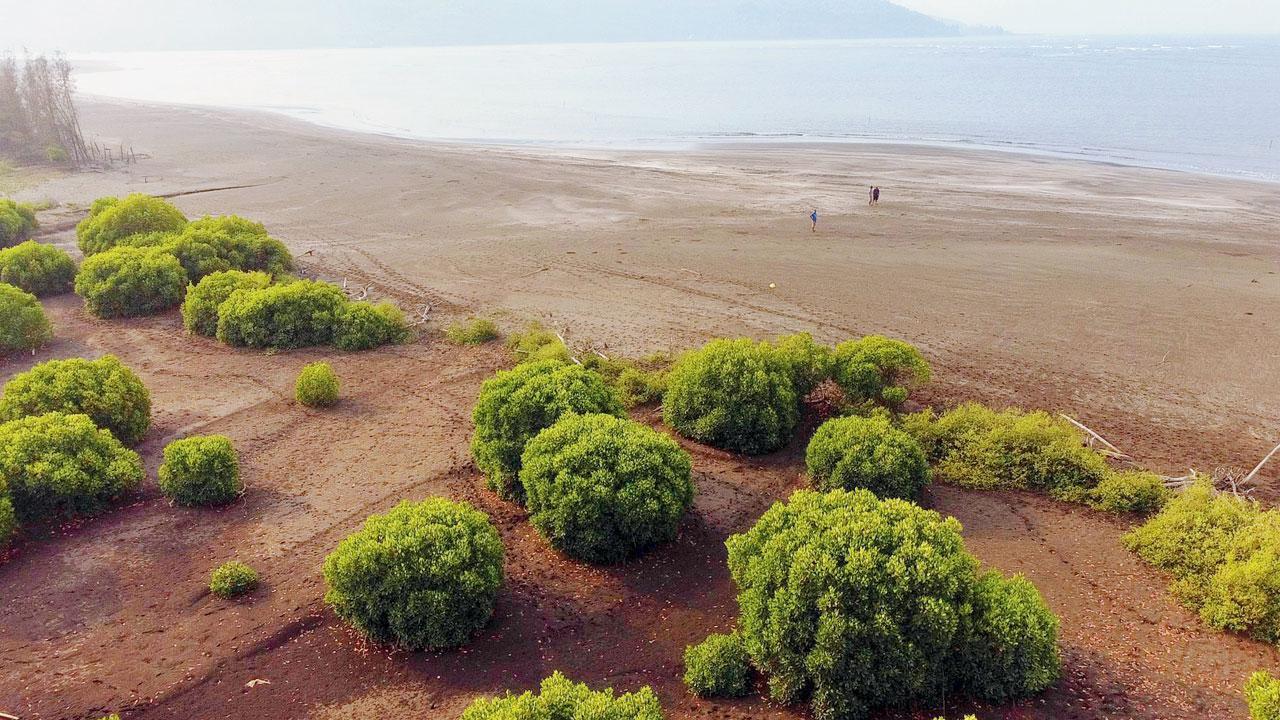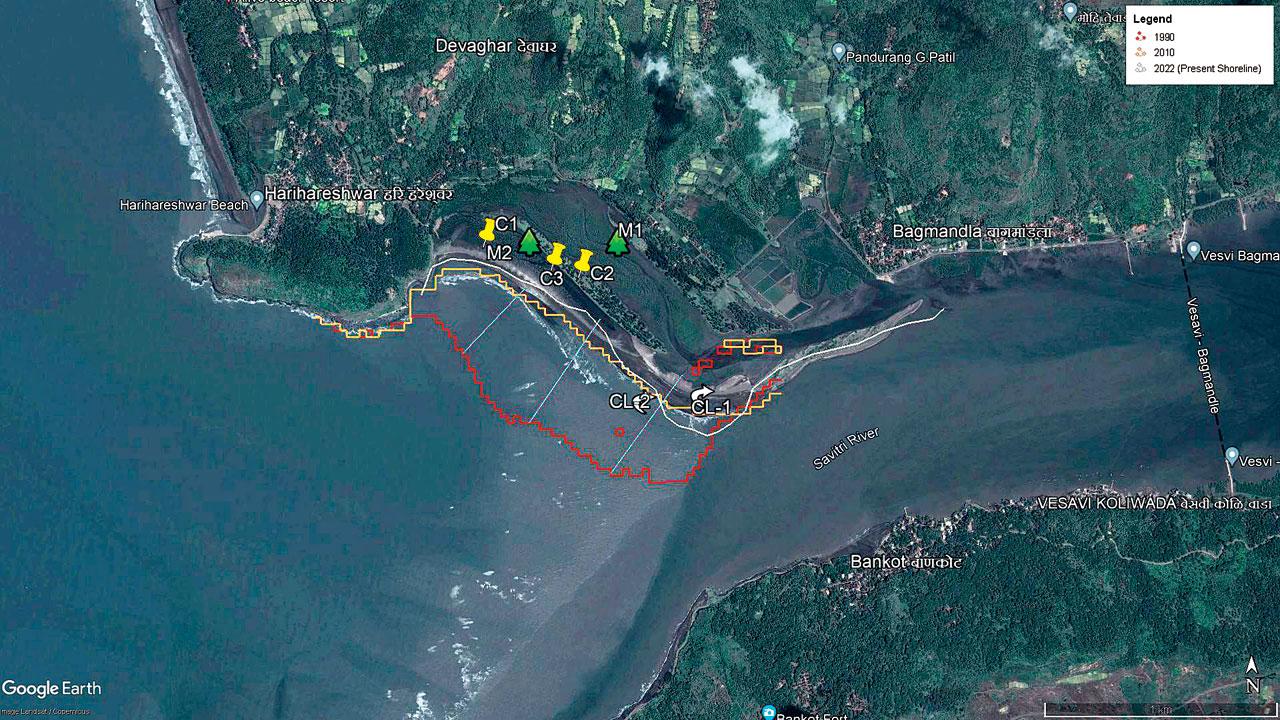NGO’s study shows massive coastal inundation, shoreline erosion over three decades; says climate change, sand mining to blame

The Devghar shoreline
Nearly 55 hectares of coastal ecosystems—an area equivalent to 10 Wankhede stadiums—near Devghar in Raigad district has submerged over the past three decades, shows a study. Pune-based Srushti Conservation Foundation (SCF), a non-profit organisation, conducted the study close to the mouth of Bankot Creek, which has a 1.5-km-long beach, using satellite images. Information from the locals about erosion prompted the study.
ADVERTISEMENT
Preliminary statistics show there was a total loss of around 55 hectares of coastal habitats between 1990 and 2022, including mangroves, creeklets, mudflats and sandy coastlines, and erosion of over 300 metres of shoreline. “It clearly indicates a worrying sign of coastal inundation and extreme shoreline erosion, which has prompted concerns about the effects of climate change,” the researchers said.

A satellite image showing the erosion over the years
Explaining their findings, SCF Managing Director Dr Deepak Apte said, “It was observed that the satellite-derived shoreline (unsupervised classification-based water body boundary) had now shifted 300-500 metres towards land. Besides, it was clear that mangrove and Casuarina plantations were also not able to withstand the loss of sediment and eventually they got uprooted.”
Also Read: Mumbai: Chhagan Bhujbal's son, nephew seek dropping of PMLA proceedings in view of SC guidelines
A change in the sediment profile, from a clay-silty to a coarse-sand dominant seascape, has also been observed. “Large expanses of mangroves are already on the verge of extinction, most likely as a result of a change in sediment structure from muddy to sandy nature. Some of these areas are now beginning to recover,” said Apte. In 2020, the landfall of Cyclone Nisarga close to the coast of Devghar saw the death of trees, shrubs and approximately five hectares of mangrove species.
Lessons learnt
The study concluded that there is a need for a systematic examination of how the shoreline is changing, like in various parts of the state. For instance, in many places, saltwater intrusion is causing mangroves to grow on agricultural lands, and in many others, sediment loss results in significant erosion.
“Climate change-related sea-level rise will further worsen the situation. The government should commission a study to seek solutions to deal with the changing seascape. We are currently doing ad hoc interventions which will only worsen the situation,” Apte said. He added, “It will not only erode our natural barrier, but will also facilitate erosion in the long run.”
The SCF’s studies on the impact of Cyclone Nisarga on mangrove and non-mangrove areas show that mangroves are crucial during storm surges and cyclones. “Unregulated construction of seawalls is another case where the problem of erosion is shifted from one place to another. These may be temporary fixes for severely deteriorating shorelines, but they cannot and should not be the only options,” explained Apte.
Sand mining threat
Sand mining has allegedly been taking place in the vicinity of Devghar beach near Bankot Creek. Although the effect of sand mining on erosion in the Devghar region is still unknown, studies have found that unrestricted sand mining is accelerating erosion in various locations along the Maharashtra coastline. For instance, several areas between Alibaug and Mandwa have seen illegal sand mining entirely erode beaches.
“While on one side sea level is increasing and on the other side sand mining on beaches is flattening natural shore gradients facilitating coastal inundation. In the case of sand mining in the creeks, these are getting deeper and deeper, facilitating erosion and large-scale saltwater inundation in nearby areas, as it increases its water carrying capacity during high tides and storm surges. Though deepening of creeks is necessary and essential in many cases to facilitate storm water drainage, especially in the rainy season, it is very site-specific and needs to be done in a very careful manner,” said Apte.
In the case of Devghar, an increase of erosion coincides well with the construction of bridges and related activities, the study found. Sumaira Abdulali, the convenor of Awaaz Foundation, which has pioneered and led the anti-sand mining campaign in India since 2004, told mid-day that after climate change, sand mining is another major contributor to the problem. “...We have found evidence of a long-term effect of sand mining on our coastline which has submerged and shrunk.”
SCF’s suggested solutions to the state
>> Focus on developing a shore management policy, keeping climate change in mind
>> Launch community-based climate resilience, adaptation and awareness programmes
>> Start scientific management across creeks to maintain optimal depth and water level
>> Review the Kharland Bund Policy, as construction of bunds to prevent saltwater ingress will only shift the problem from one place to another. It is facilitating large-scale mangrove mortality
>> Review the efficacy of sea walls and their impact on shore erosion in nearby areas
 Subscribe today by clicking the link and stay updated with the latest news!" Click here!
Subscribe today by clicking the link and stay updated with the latest news!" Click here!







